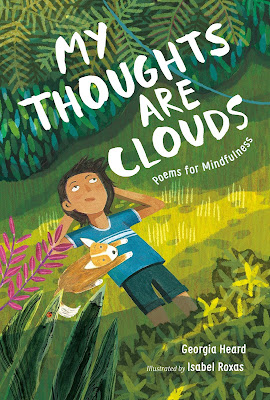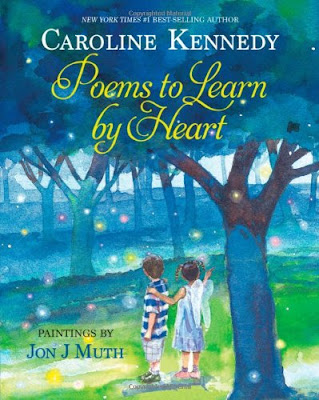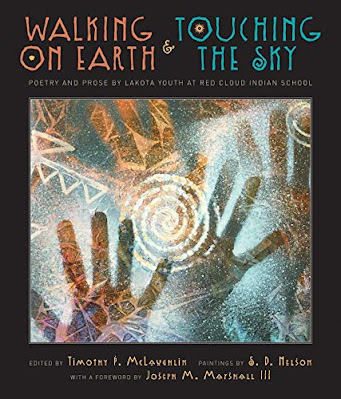Punching the Air
Bibliography:
Zoboi, Ibi and Yusef Salaam. Punching the Air. Ill. by Omar T. Pasha. New York: Balzer+Bray, 2020. ISBN: 978-0062996480
Summary:
Amal Shahid, a young, Black artist and poet at an arts high school, finds himself at the wrong place at the wrong time, irrevocably changing the trajectory of his life. A confrontation in a gentrifying neighborhood lands him in juvenile detention for a crime that he didn’t commit. After he faces trial where Ms. Rinaldi, his AP art teacher, serves as a poor character witness, he must survive the dehumanization of being processed and incarcerated. Amal survives on correspondence with Zenobia, a classmate who he never got the nerve to ask out, and they share letters and drawings though the mail. He cautiously forms an alliance with several other young men to watch each other’s backs, and they share a sense of brotherhood as they follow their program of classes and avoid trouble with a white supremacist guard. The collection of poems, divided into three parts, explores the parallels between slavery and the prison industrial complex, and Amal reads the books his uncle brings him by Malcolm X, James Baldwin, Richard Wright, Toni Morrison, Octavia Butler, Ibram X. Kendi, and Ta-Nehisi Coates. Through the power of art and poetry, and with the help of a prison-abolitionist poetry teacher, Amal struggles to retain his humanity, transform his brutal situation, and hold on to hope.Analysis:
Punching the Air is a profound and timely work of art informed by the experience of co-author Yusef Salaam, one of the Exonerated Five who were wrongfully convicted and incarcerated in the Central Park jogger case in New York City in 1989. Although Salaam draws from his experiences during his 22-year sentence and includes some poems that he wrote in prison, Amal’s story is a work of fiction. Together with Ibi Zoboi, they craft a lyrical portrait of humanity that represents the struggle of far too many Black teenagers who are stereotyped and reduced by a racist criminal justice system. In the poem “New ID,” the authors use repetition and parallel structure to drive home how incarceration strips humans of their identity and future: “On the day of my conviction / I memorize / my inmate number / my crime / my time // On the day of my conviction / I forget / my school ID number / my top three colleges / my class schedule.” The repetition used throughout the novel emphasizes Amal’s struggle against obsessive, repetitive thoughts that plague him at night in his cell.
The use of repeated poem titles draws thematic connections between the poems which are full of allusions to artistic works and styles (Cubism, Surrealism, Expressionism, Picasso Face, The Scream, The Thinker, The Persistence of Memory, Guernica, Young Basquiat, American Graffiti) and references to the history of slavery (Slave Ship, Middle Passage, Coming to America, Auction Block). The authors highlight the eerie institutional language of the criminal justice system with poems such as Processed and reveal the unforgiving nature of the “zero tolerance” school system with poems like Pipeline and Schooled. The poem Booked takes on the double meaning of education and arrest. This interplay of multiple meanings appears again in the poems entitled White Space, which refers to the artistic concept of negative space as well as the gentrification that transforms their city into spaces where Amal and his friends can no longer exist. This concept appears again in the poem The Persistence of Memory: “But on the other side, the big houses / (some painted in bright colors, others run-down) / got fixed up nice and painted over in grays and beiges / making that part of our hood look like a futuristic suburb / and soon there was this invisible line we couldn’t cross / like we can’t go where the nice places are / Can’t touch the nice things because everything about us / our skin, our faces, our hair, our words, our music / will break things / will ruin things / will make things ugly / just by us being there.” Moments like this will stop readers in their tracks as the painful truths of our societal inequities find tangible expression.
Although most of the poems are written in unrhymed free verse, there are moments when Amal can’t contain his expression and it bursts forth in a torrent of rhymes: “I bang out a rhythm / make the door a drum / make my fist a mic / make my words a bullhorn / make my truth the air / Stop killing, brother / you are already marked / because of your color / So why not put us all in jail? / Chance we’ll become like snails / Chance we won’t rebel / On me, they left indelible scars / I’m over here spitting rhymes behind bars / They thought the box would get me / like Kunta in captivity / but I’m still free...” Amal’s rhymes are rich with imagery, simile, metaphor, allusion, repetition, and poetic devices. In these moments of unbridled expression, his lyricism breaks through his captivity and he finds moments of freedom.
The shapes of the poems themselves create a visually compelling reading experience. Some poems appear as boxes representing the claustrophobic walls and regrets that keep Amal trapped. Varying indentation, alignment, and text shapes are set against the grayscale treatment of Omar T. Pasha’s illustrations. These visual designs take the form of subtle washes of gray, splatters of paint or blood, feathery brush strokes, microphones and skateboards, graffiti, pencil-drawn butterflies and roses, cubes and crosshatches, making the entire book feel like an artist’s sketchbook.
Although this verse novel is highly accessible, it is anything but simple. Punching the Air is complex and layered with meaning, and its rich artistry of juxtaposition and historical allusion demands multiple readings. What Zoboi and Salaam have created will no doubt become a timeless classic because of its deep importance and masterful composition. Ages 14 and up.
Excerpt:
BLIND JUSTICE II
All because
All because
Activity:
- After reading the poem together, invite groups of students to prepare spoken word performances of the same poem.
- Encourage them to think creatively about how to divide up the lines and what lines should be read in unison and what lines should be read in a solo voice.
- After rehearsing, regroup and share performances.
- What did the various performances reveal?
- Discuss.




Comments
Post a Comment